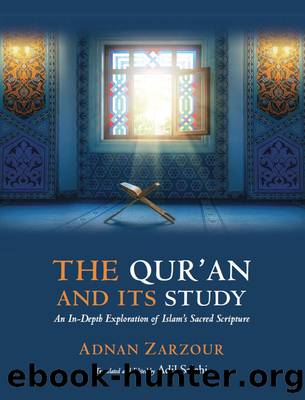The Qur'an and Its Study by Adnan Zarzour

Author:Adnan Zarzour [Abdur Raheem Kidwai]
Language: eng
Format: epub
ISBN: 9780860377955
Publisher: Kube Publishing Ltd
Commentaries by Sufi Philosophers
Interpretation based on feelings was then infused, in many cases, with esoteric concepts or influenced by some philosophies that crept into Sufism. As a result, an extremist or philosophic Sufism came into existence, pioneered by people like al-ḤallÄj, al-Sahrawardi and âAbd al-Ḥaqq ibn SabâÄ«n. Shaykh Muhammad âAbduh mentions this as he says of the interpretation based on feelings: âIn this type of interpretation esoteric concepts are mixed up with Sufi ones.â517
The most important influences this type of Sufism left on the interpretation of the Qurâan are pantheism, Neo-Platonism and the so-called esoteric knowledge. Indeed, much of these Sufi interpretations were mixed up with esoteric explanations which were, and remain, prominent among the Ismaili Shia in particular. Ibn KhaldÅ«n said: âThe idea of union with God, which has been floated by some Sufis, was due to their mixing with the Ismailis who believed in such union and the divinity of the Imams. Each party took from the other and their theses and beliefs were mixed up and sounded alike.â518
We, therefore, need only to speak about esoteric interpretations, but we should note that the commentary attributed to Shaykh MuḥyÄ« al-DÄ«n ibn âArabÄ« (died 638 AH/1241 CE) and published in two volumes, and also in the margin of al-ShirÄzÄ«âs âArÄâis al-BayÄn, was actually written by âAbd al-RazzÄq al-QÄshÄnÄ« (died 730 AH/1333 CE).
Of this type of interpretation, where esoteric concepts are mixed up with Sufi ones, is âthe commentary some attribute to the grand Shaykh MuḥyÄ« al-DÄ«n ibn âArabÄ«, but was in fact written by al-QÄshÄnÄ«, a well-known esoteric philosopher. It contains ideas that are clearly alien to Godâs faith and His glorious Book.â519 We need not mention here the interpretation of Qurâanic verses that are included in Ibn âArabÄ«âs books, particularly Al-FutūḥÄt al-Makiyyah and Fuṣūṣ al-Ḥikam. Ibn âArabÄ« himself disclaims believing in the concept of union with God.520 Moreover, the sections that occur in Al-FutūḥÄt al-Makiyyah and may be taken as indicative of pantheism may have an appropriate explanation. Besides, they might not have been written by him in the first place.
Download
This site does not store any files on its server. We only index and link to content provided by other sites. Please contact the content providers to delete copyright contents if any and email us, we'll remove relevant links or contents immediately.
| Hadith | History |
| Law | Mecca |
| Muhammed | Quran |
| Rituals & Practice | Shi'ism |
| Sufism | Sunnism |
| Theology | Women in Islam |
The History of Jihad: From Muhammad to ISIS by Spencer Robert(2215)
Nine Parts of Desire by Geraldine Brooks(2014)
The Turkish Psychedelic Explosion by Daniel Spicer(2000)
The First Muslim The Story of Muhammad by Lesley Hazleton(1891)
The Essential Rumi by Coleman Barks(1641)
The Last Mughal by William Dalrymple(1575)
Trickster Travels: A Sixteenth-Century Muslim Between Worlds by Davis Natalie Zemon(1547)
1453 by Roger Crowley(1511)
by Christianity & Islam(1354)
God by Aslan Reza(1339)
Muhammad: His Life Based on the Earliest Sources by Martin Lings(1309)
A Concise History of Sunnis and Shi'is by John McHugo(1279)
Magic and Divination in Early Islam by Emilie Savage-Smith;(1205)
The Flight of the Intellectuals by Berman Paul(1187)
No God But God by Reza Aslan(1166)
Art of Betrayal by Gordon Corera(1136)
What the Qur'an Meant by Garry Wills(1124)
Getting Jesus Right: How Muslims Get Jesus and Islam Wrong by James A Beverley & Craig A Evans(1083)
The Third Choice: Islam, Dhimmitude and Freedom by Durie Mark & Ye'or Bat & Bat Ye'or(1071)
